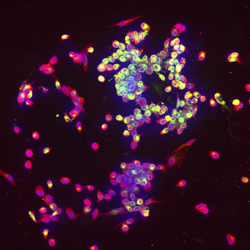HIV hampers regulatory T cell development
Extensive research has shown that HIV impairs regulatory T cells by infecting the thymus and affecting its function. Of particular relevance to HIV infection are the natural regulatory T cells (nTregs) that get selected by high-avidity interactions in the thymus to control immune responses. Lack of specific markers to distinguish natural from inducible regulatory T cells has hampered the extensive investigation of nTregs. The EU-funded 'Impact of IL-7 and IFNa on nTreg development' (3ITD) project investigated the phenotype and function of nTregs that emigrate from the thymus. The mechanisms by which these cells are implicated in immune responses were also looked into. Studies on T cells revealed that the fraction of nTregs that emigrated from the thymus lacked expression of CD127 but was positive for CD25. CD25 is a protein present on interleukin-2 (IL-2) receptor (usually present on Tcell activation). CD127 is a protein found on the IL-7 receptor, critical for immune cell development. CD25 cells were encountered at reduced levels in the peripheral blood of HIV patients when compared to controls. Similar findings have been reported in Simian immunodeficiency virus (SIV)-infected animals as well as in autoimmune patients. Study findings suggest that the acquisition of CD25 may be a result of the interaction between immature T cells and the thymus. Additionally, the low CD25 expression in the regulatory T cells of HIV patients could be a result of an impaired activation in the thymus. Using in vitro functional assays, scientists further proved the impaired activation in natural regulatory T cells lacking in CD25. Apart from providing important knowledge on the T cell maturation process in the thymus, 3ITD study results have clinical implications. Natural regulatory T cells could be utilised in clinical practice to provide immune-based therapies that can reconstitute a functional immune system after HIV infection.







